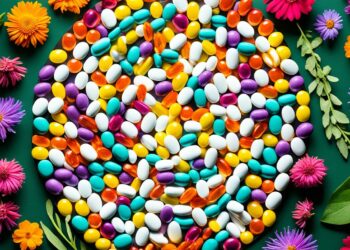Did you know making small changes can greatly improve your life as you get older? Healthy habits, like eating well and staying active, can make you live longer and feel better. The choices you make every day are key to your health.
Healthy aging means taking care of your body and mind. This includes eating right, exercising, and managing stress. It also means having good friends and a strong community. Eating foods low in red meat but high in fruits and veggies is important. So is being part of a caring group.
Let’s look at how these things work together for a better life as you age. We’ll see what experts say about how our daily choices affect our aging.
Key Takeaways
- Small changes in lifestyle choices can lead to significant improvements in longevity and quality of life.
- Regular physical activity is crucial for preventing Alzheimer’s disease and maintaining overall health.
- A balanced diet rich in fruits and vegetables contributes positively to healthy aging.
- Social engagement is vital for mental health and life satisfaction in older adults.
- Establishing a supportive social network enhances commitment to healthy lifestyle habits.
- Modest, consistent increases in activity and dietary changes are effective strategies for improved wellness.
The Importance of Regular Exercise
Regular exercise is key to living a long and healthy life. Studies show that being active helps you age well. It makes life better and can even make you live longer. People of all ages see the benefits of staying active, which is vital for staying healthy in body and mind.
Benefits of Physical Activity
Adding exercise to your daily life has many perks, like:
- Improved cardiovascular health: Working out makes your heart and lungs stronger, keeping your energy up.
- Increased muscle mass: Lifting weights helps keep and grow muscle, which gets weaker as you get older.
- Enhanced flexible movement: Doing exercises that improve flexibility helps you move better and lowers the chance of falling.
- Mood enhancement: Exercise releases happy chemicals in your brain, making you feel better mentally.
Staying active fights back against aging’s downsides. It shows why picking exercises that fit you is important. For more tips on staying healthy, check out this useful guide.
Types of Exercises to Consider
Building a good fitness plan means mixing up your workouts, like:
- Aerobic exercises: Walking, jogging, or swimming are great for your heart.
- Strength training: Using weights or resistance bands keeps muscles strong and boosts metabolism.
- Flexibility and balance exercises: Yoga and tai chi make you more flexible and less likely to get hurt.
Knowing about different exercises helps you make a routine that fits your life and boosts your health. Being active isn’t just about living longer. It’s about making every year of your life better.
Nourishing Your Body: The Role of Nutrition
Nutrition is key to a long and healthy life, especially for older adults. Eating right can greatly improve well-being and life quality. The Mediterranean, DASH, and MIND diets are great for older people’s nutritional needs.
Understanding the Mediterranean Diet
The Mediterranean diet is all about eating lots of fruits, veggies, whole grains, and healthy fats. It’s linked to a lower risk of heart disease and keeping the mind sharp. Foods like olive oil, fish, nuts, and legumes make meals tasty and support health.
In the U.S., older adults often eat well, scoring 63 out of 100 on the Healthy Eating Index. Following this diet can help them get even better scores.
Adopting the DASH and MIND Diets
The DASH diet is all about eating low-sodium foods to lower blood pressure. The MIND diet combines parts of the Mediterranean and DASH diets. It focuses on foods that are good for the brain, like green leafy veggies, berries, and whole grains.
These diets are great for the heart and brain. They help you stay healthy at any age. Programs like Supplemental Nutrition Assistance Program (SNAP) make it easier to get these healthy foods.
| Diet Type | Key Components | Health Benefits |
|---|---|---|
| Mediterranean Diet | Fruits, vegetables, whole grains, healthy fats (olive oil) | Heart disease prevention, cognitive decline reduction |
| DASH Diet | Low-sodium foods, lean proteins, whole grains | Blood pressure management, overall heart health |
| MIND Diet | Leafy greens, berries, nuts, whole grains | Enhanced cognitive function, support against Alzheimer’s |

Lifestyle Choices That Promote Longevity and Healthy Aging
Managing stress and getting good sleep are key to living a long and healthy life. Stress can lead to mental and physical health problems. Getting enough sleep helps your mind and heart stay healthy.
Managing Stress Effectively
Stress management is vital for your mental and physical health. Activities like yoga, meditation, or deep breathing can ease tension. Changing bad habits to healthy ones helps you handle stress better. Regular exercise is also good for stress and staying strong.
Getting Quality Sleep for Health
Good sleep is essential for aging well. Adults should sleep 7-9 hours each night. Bad sleep habits can lead to health problems, like memory loss and chronic diseases.
Creating a regular sleep schedule and a calm bedtime routine can help. These habits improve your mental health and help you live longer.
| Aspect | Importance | Healthy Habits |
|---|---|---|
| Stress Management | Reduces chronic health risks, promotes mental clarity | Yoga, meditation, physical activity |
| Quality Sleep | Supports cognitive function, mood stabilization | Consistent sleep schedule, bedtime routine |
The Impact of Social Connections on Health
Social connections deeply affect your health and how long you live. Having strong relationships builds a network that helps your emotional and mental health. Being with others creates bonds that fight loneliness and encourage healthy living.
The Link Between Relationships and Longevity
Studies show that people with strong social ties live longer. Having a healthy network of friends can increase your chance of living a long life by 50%. Feeling lonely is as bad as smoking and being obese. It can cause serious health problems like depression, heart disease, and dementia. So, it’s key to take care of your relationships for your health.
Building a Supportive Social Network
To have a strong network, you need to be active in your social life. Here are ways to build and keep your connections:
- Join community activities to meet new people.
- Spend time with your friends to make your bond stronger.
- Find clubs or groups that match your interests.
- Stay in touch with family and friends to keep your relationships close.
- Go to social events to meet others.
A strong network helps you feel less alone and boosts your mental health. Being around positive people releases happy hormones like dopamine. This makes you feel good and helps you make more friends. Being part of a group also helps you sleep and stay healthy, making you feel better overall.

| Health Risks of Loneliness | Involved Health Benefits of Social Connections |
|---|---|
| Depression | Improved Mental Health |
| Anxiety | Enhanced Emotional Support |
| Increased Suicide Risk | Higher Happiness Quotient |
| Dementia | Better Cognitive Functioning |
| Heart Disease | Improved Physical Recovery |
| Stroke | Longer Lifespan |
Putting social connections first is good for your health. These relationships make you happier and give you the support you need for a healthy life. Having a big network of friends is key to feeling good overall.
Preventive Healthcare: A Key to Healthy Aging
Preventive healthcare is key to aging well. Regular check-ups can catch health problems early. This is crucial for older adults facing age-related diseases. Being active in your healthcare keeps your life quality high.
Importance of Regular Check-Ups
Regular check-ups are vital for finding hidden health issues and managing current ones. They let your healthcare team watch for health changes. This means they can act fast to stop problems before they get worse.
Many people over 65 have chronic illnesses. Your doctor can give advice that fits your needs. This helps you stay on top of your health.
Screenings and Vaccinations for Older Adults
Screenings and vaccines are key for older adults’ health. They check for heart disease, diabetes, and cancer. Vaccines strengthen your immune system against diseases.
The flu vaccine is especially important for older adults. It helps protect them from getting very sick during flu season. Regular screenings and vaccines are crucial for staying healthy and living longer.
| Preventive Measures | Benefits |
|---|---|
| Regular Check-Ups | Early detection of health issues |
| Screenings | Identify chronic conditions |
| Vaccinations | Boost immunity and prevent illness |
| Health Monitoring with Technology | Track health indicators in real-time |
Being proactive with preventive healthcare boosts your health and fights aging’s effects. Working with your healthcare team, keeping up with check-ups, and staying on top of screenings and vaccines leads to a better, longer life. For more on aging and health, check out the science of aging.
Conclusion
Making smart lifestyle choices is key to living a long and healthy life. Eating a diet full of fruits, veggies, and nuts, and staying active, boosts your health. Research shows that eating like the Mediterranean diet lowers the risk of chronic diseases and can help you live longer.
Managing stress and having strong social connections are also important for aging well. Being in meaningful relationships and getting good sleep can make you feel and be healthier. These things help you bounce back from tough times.
Going for regular health check-ups and screenings can change how you age. By knowing what to do and following research, you can look forward to a healthier future. For more on how diet affects your health, check out this article.
FAQ
What lifestyle choices can promote longevity and healthy aging?
Regular exercise, balanced nutrition, managing stress, getting quality sleep, building strong social connections, and preventive healthcare are key. These choices greatly affect how long and well you age.
How does regular exercise contribute to healthy aging?
Exercise keeps your muscles strong, helps with weight control, and boosts your overall health. This leads to a better life and might even add years to your life.
What are some effective types of exercises for older adults?
Include aerobic, strength training, and flexibility exercises in your routine. These can be done daily to keep you physically fit.
Why is nutrition important for aging individuals?
Eating right, like following diets such as the Mediterranean, DASH, and MIND, lowers heart disease and brain decline risks. It supports your health as you get older.
How can I manage stress effectively for better health?
Use yoga and meditation, or other relaxation methods, to reduce stress. This is key for keeping your mind and body healthy as you age.
What is the role of sleep in healthy aging?
Getting 7-9 hours of sleep each night is crucial. It helps keep your mind sharp, mood stable, and body healthy, which is good for living a long life.
How do social connections impact longevity?
Having strong social connections is linked to better mental health and living longer. Friends and family offer emotional support and encourage healthy living.
What preventive healthcare measures should older adults prioritize?
Make sure to have regular check-ups, screenings, and vaccinations suited for your age. These steps help catch health issues early and keep you healthy.




